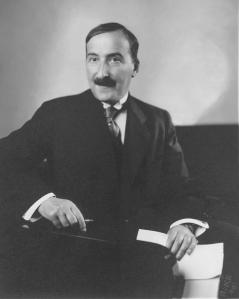There was a bit of a furore over on the LibraryThing NYRB group recently on the subject of Stefan Zweig. I follow the group because I like a lot of the books NYRB publish, and I was interested in the thread because I’ve read a few Zweigs and in many ways feel I haven’t quite got a handle on him yet. The views on LT were quite polarised, with some writers loving his work and some trashing him. One commenter linked to a piece from the London Review of Books several years ago, a really venomous article that absolutely laid into Zweig – pilloried him as a writer and a person, which seemed a little out of proportion to me (and frankly, in places it was really distasteful and disrespectful). Certainly, the Zweigs I’ve read are very personal, inward looking stories, but that doesn’t seem reason enough to condemn him.

Digging about on the net, I came to another piece in the Guardian which again questioned his reputation. The feeling seems to be that he wrote trivial, superficial tales, refusing to engage with the changes in the world around him, the collapse of his empire and the bigger issues. However, one commenter on the Guardian, Will Stone (I assume maybe the translator of “Rilke in Paris, which I reviewed here) sprang to Zweig’s defence and mentioned the short story “Buchmendel” as an example of Zweig’s art. I was intrigued enough to search this out, as I felt much of the criticism was unjustified.
“Buchmendel” appears in an old volume from Pushkin Press of Zweig’s “Selected Stories”, translated by Eden and Cedar Paul. As it opens, a writer takes shelter from the rain in a bar. Sitting waiting for the storm to pass, a hint of memory flashes into his consciousness – he knows the bar somehow, has been there before, and as he struggles to regain the past and walks round the room, his memory suddenly comes back. Before the First World War, he used to visit the same bar, when he was a student; and he starts to recall the most striking personality in the bar, Jakob Mendel, who was in effect a walking library. On any subject, his prodigious brain could recall the books to read, and he could find rarities for students and scholars. His celebrity was such that he was allowed to stay in the bar at all times, sending out for meals, while people came to consult him. But now the war is over, the world has changed and the bar is in different hands. How can the narrator find out what happened to Mendel? Luckily, there is still one old staff member at the bar who can tell him…
Well, Will Stone was right. This story is a powerful argument in favour of Zweig’s talents as a writer, and a strong refutation of the accusation of his lack of engagement with the real world. The narrator is emotional about the changes that have taken place in his world, saddened at the fate of Mendel, regretful of the missing past. But this is no overwrought and highly coloured tale of love and loss; instead it is the story of an intelligent but blinkered man overtaken and crushed by events. Zweig engages with the brutality of the real world, the stupidity of those in uniform and authority, and the increasing intolerance of modern society towards those who do not fit in. Mendel lives in a world of his own, of books and learning, and is totally unsuited to deal with the closed, narrow minds of the military. The end is inevitable and moving, and I empathised with Zweig’s narrator in his elegiac recalling of a lost world. And the writing is superb, particularly at the start when the narrator is suddenly assailed by a sense of deja vu, trying to dredge for lost memories, for a past he has put out of mind.
I’m so glad Stone’s comment pointed me to “Buchmendel”; the criticisms of the naysayers have gone down in my estimation and Zweig has gone up. His talent as a writer is enormous, to be able to pack such emotional punch into one short story, and comment on civilization versus brutality. There is room for all kinds of literature in the world, and you don’t have to write a huge political novel, railing at the world, to make a point. Like Zweig, you can work on a smaller canvas, but with skill like his the effect can be just as devastating. I shall *definitely* be reading more Zweig.







Apr 03, 2014 @ 11:05:24
Loved Buchmendel when I read it some years back. The writing evokes such a strong sense of place and time. Also love Zweig’s way of telling a story. A truly gifted storyteller.
Apr 03, 2014 @ 11:42:03
I agree – reading Zweig more widely has definitely made me appreciate his work more.
Apr 03, 2014 @ 20:46:38
Well I can’t enter the debate as I have never read Zweig but “Buchmendel” sounds fascinating, powerful.and certainly something I would enjoy.
Apr 03, 2014 @ 20:52:48
I think you *would* enjoy his writing – it’s very evocative!
Apr 03, 2014 @ 21:35:19
Stefan Zweig’s non-fiction, including his autobiography The World of Yesterday, is now available in eBook form from Plunkett Lake Press: http://plunkettlakepress.com/zweig.html
Apr 03, 2014 @ 21:40:45
Thanks!
Apr 04, 2014 @ 03:10:49
I very much admire The Post-Office Girl, and am astonished to learn that Zweig has been attacked by critics. I’ll have to look for this story. I saw my first Pushkin Press books in England!
Apr 04, 2014 @ 08:22:09
It was a really nasty article in places actually – particularly when it made disparaging remarks about his suicide and the very sad photo of Zweig and his wife on their deathbed.
Pushkin Books are lovely – I’d adore a complete set on my shelves, but then I might need a new house!
Apr 04, 2014 @ 10:22:41
Thank you for such an interesting post. I keep seeing Beware of Pity in bookshops and thinking it looked good but I was unaware of the Zweig debate. Now I am even more intrigued!
Apr 04, 2014 @ 10:31:36
I was quite surprised myself to discover the debate, because up until then all I’d heard about Zweig was positive. I was astonished that he’d polarised opinions so much, but I certainly found this story very powerful.
Apr 05, 2014 @ 00:57:51
Thank you for flagging up my riposte to Hofmann on the Guardian site, i was under the impression no one had even seen it. The fact is Hofmann is something of an expert on Joseph Roth not Stefan Zweig. His extreme opinions re Zweig are in part based on the correspondence between Zweig and Roth… but this is a complex area. I doubt Hofmann had ever read Buchmendel or many other texts. His attack on Zweig was wilfully spiteful, absurd and wholly inaccurate, but i had seen it coming and was only relieved in a way it was not my own book of Zweig translations which took the brunt. But there was quite an international backlash in Zweig’s favour. If you are interested in Zweig’s writings you should explore his non fiction which is, apart from the few things i have done, grossly underrepresented, at least in modern translations. My ‘Journeys’ (European travel essays) and ‘Nietzsche’ were both published by Hesperus Press in 2010 and 2012 respectively. A first English translation of the final essay on Montaigne is also forthcoming from Pushkin Press. Zweig was prodigious in the essay form as much as the short story or novel, people are just not aware of this in the UK yet since most of his essays are as yet untranslated and fiction always takes precedence over non fiction in this country. Will Stone
Apr 05, 2014 @ 09:32:08
Thanks Will – I was just pleased to see that someone was springing to Zweig’s defence, because the article seemed to me nasty and out of proportion. And “Buchmendel” is a truly wonderful story as you point out, so thanks for pointing me in its direction. I will certainly track down his non-fiction – “Journeys” in particular sounds very appealing!
Apr 07, 2014 @ 15:31:55
I agree. Hofmann does seem to have an almost compulsive hatred of Zweig – I was reading his trans of Roth’s letters and he mentions three or four times there how Zweig was a speck on Roth’s shoe, etc etc, and each time the intervention was completely unnecessary and bizarre – especially when I think he used a footnote to slag Zweig off at one point.
Apr 07, 2014 @ 17:06:20
Gosh – how bizarre and actually unpleasant. Not what I would call being an objective scholar!
Apr 09, 2014 @ 15:03:11
Zweig is not the only author to be hatcheted by Hofmann, but his treatment was particularly vicious, and I am afraid such violence interferes with sane judgement. The suggestion that Zweig’s suicide was some sort of kitsch indulgence, was the final nail for me…
Apr 09, 2014 @ 15:11:06
Me too – that kind of comment is not justifiable on any level at all. It’s just pure nastiness. But his article has had a positive effect in that I am more determined than ever to read more of Zweig’s work (and indeed have sent off for a copy of your translation of “Journeys”!)
Jun 06, 2014 @ 07:46:39
Dec 30, 2014 @ 08:21:47
Nov 02, 2018 @ 06:53:48
Oct 25, 2022 @ 07:02:05